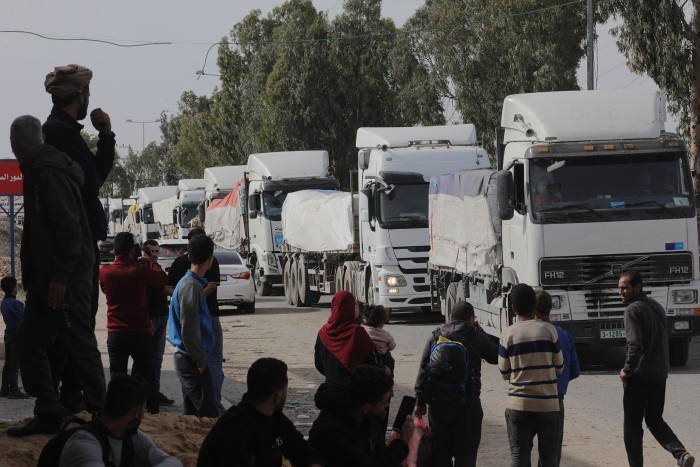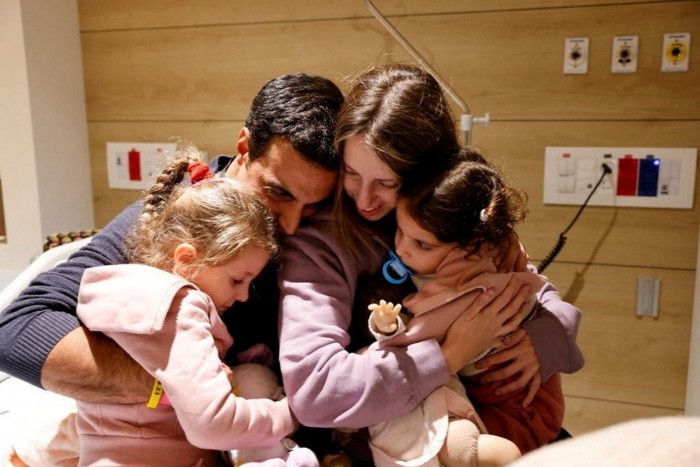Hamas has handed 17 hostages over to aid workers after a seven hour delay as a dispute about humanitarian deliveries into the besieged Gaza strip threatened to derail the temporary truce between Israel and the Palestinian militants.
Qatar and Hamas said in a statement released late on Saturday that the group had transferred a second group, consisting of 13 Israelis and four foreign nationals, to the International Committee of the Red Cross for transportation to Israel.
Majed al-Ansari, a spokesman for Qatar’s foreign ministry, said the hostages were “on their way” to the Rafah border crossing with Egypt. The Israeli military said the four non-Israelis were from Thailand.
The Palestinian militant group had earlier warned that it would not release any more of the people it had seized in its October 7 attack until Israel “commits to the terms of the agreement relating to entry of aid trucks to northern Gaza”. Relief is being trucked in through Rafah, the sole operational crossing into Gaza, which is not controlled by Israel.
Al-Ansari said the “obstacles were overcome” through Qatari-Egyptian mediation. He added that 39 Palestinians would be released from Israeli prisons.
The youngest Israeli hostage to be released on Saturday was three-year-old Yahel Shoham. Her grandmother, Shoshan Haran, was the eldest in the group, which also included teenage siblings Alma and Noam Or.

Hamas freed 24 captives on Friday as part of a deal under which Israel agreed to pause its offensive for four days, release Palestinian women and children held in Israeli prisons and allow more aid into the enclave.
Under the truce agreement brokered by Qatar, the US and Egypt, Hamas will free 50 Israeli civilians in groups over the four-day period, in exchange for 150 Palestinian prisoners and an increase in aid deliveries to the strip.
Both sides are supposed to meet commitments each day to ensure the durability of the deal. Saturday’s dispute underlined the fragility of the agreement between the warring parties.
Hamas official Osama Hamdan had earlier said the group had complained to Qatar and Egypt about issues including insufficient aid delivery. He also alleged that Israeli soldiers had shot at Gazans on Friday as they attempted to move northwards.
Under the four-day agreement at least 200 trucks of aid were to be delivered daily to Gaza, to which Israel has laid siege since Hamas’s attack triggered the war.
Israel said 200 trucks were entering Gaza via the Rafah crossing with Egypt after going through Israeli security checks. It said in a statement that UN agencies “led the deployment of over 50 humanitarian aid trucks to both the northern Gaza Strip and shelters that have not yet been evacuated”.
A team of Qatari officials flew into Tel Aviv on Saturday to co-ordinate with the parties and “ensure the deal continues to move smoothly and to discuss further details of the ongoing deal”, a diplomat said.
Aid workers had warned of the challenges of getting large amounts of supplies into the strip because of logistical hurdles and Israeli checks.
Although 200 trucks of aid were dispatched to the Rafah crossing on Friday, only 137 were offloaded in Gaza, the UN said. In addition, 129,000 litres of fuel were delivered.
That was still the largest aid delivery to the strip since October 7 as the coastal enclave, which is home to 2.3mn people, endures severe shortages of food, water, fuel and medicine.

Hamas on Friday freed 13 Israelis, 10 Thai nationals and a Filipino while Israel released 39 Palestinians from prison, mostly women and teenage boys.
Hamas and other Palestinian militant groups are still holding more than 200 people in Gaza, including elderly people and Israeli soldiers, after its fighters launched a savage assault on communities in southern Israel on October 7. Israeli officials said about 1,200 people were killed in the worst attack in the country’s history.
The Hamas assault triggered a ferocious Israeli military response, including a ground invasion. After six weeks of bombardment in which Palestinian officials say at least 13,300 people have been killed and 1.7mn forced to flee their homes, the temporary truce has given Gazans a brief respite.
Israel is set to release 39 Palestinian women and boys held in its jails on Saturday or early Sunday.
Nourhan Awad is one of the prisoners to be freed, according to a list released by Hamas on Saturday, after serving seven of the 13 and a half year sentence she received in 2016, convicted of attempting to stab people with scissors. The incident did not result in any deaths or major injuries, and Awad was 17 at the time of sentencing.
The pause in fighting comes as pressure mounts on Israel from allies over the human cost of the war. David Cameron, UK foreign secretary, told the BBC on Friday that “the number of casualties is too high”.
Assaf Orion, former head of a strategic division at the Israeli Defence Force, said that while “Israel has its own interests to decrease the damage to civilian population as collateral . . . at the same time we cannot keep on being, I would say, overcautious and trying to go above and beyond, to do our best in this as we used in the past”.
Violence continued in the occupied West Bank on Saturday, where clashes during a raid by Israeli soldiers killed Shamekh Kamal Abu Al-Rad, a 25-year-old doctor, according to the Palestinian news agency Wafa. The IDF said it was “aware of the claims” and was reviewing the incident.
Additional reporting by Heba Saleh in Cairo